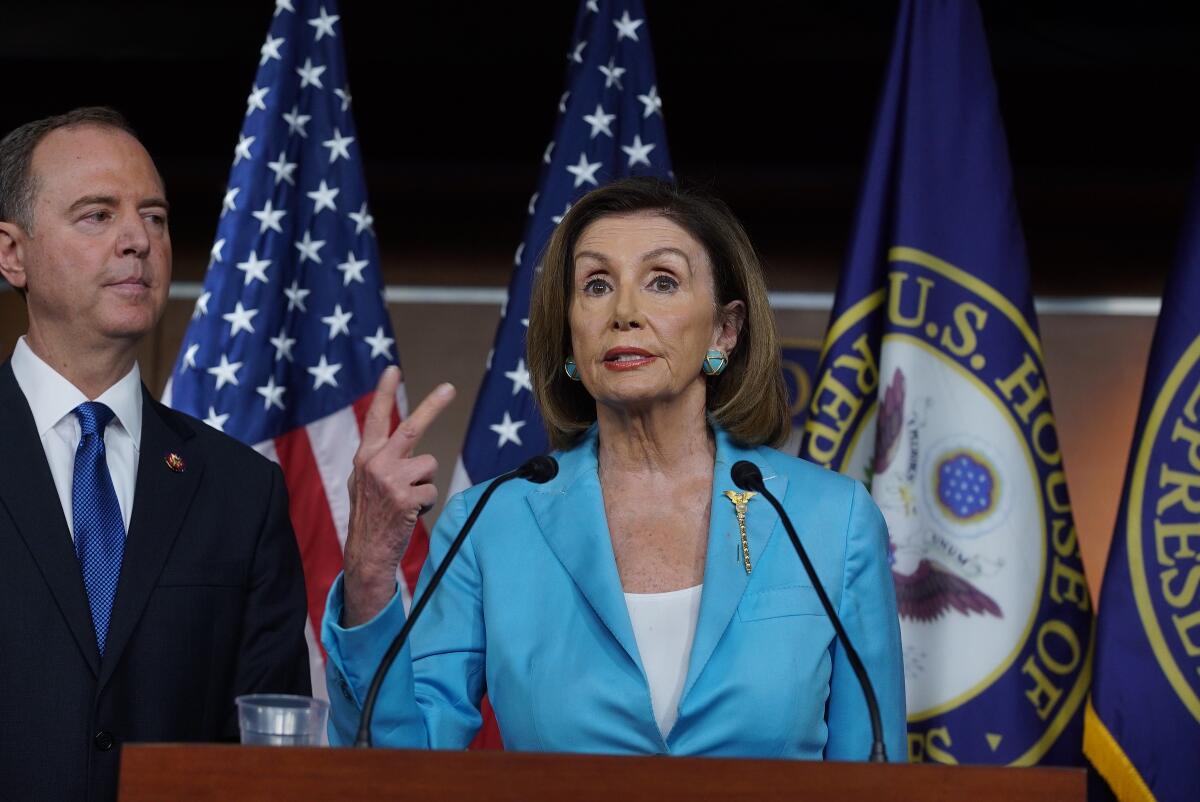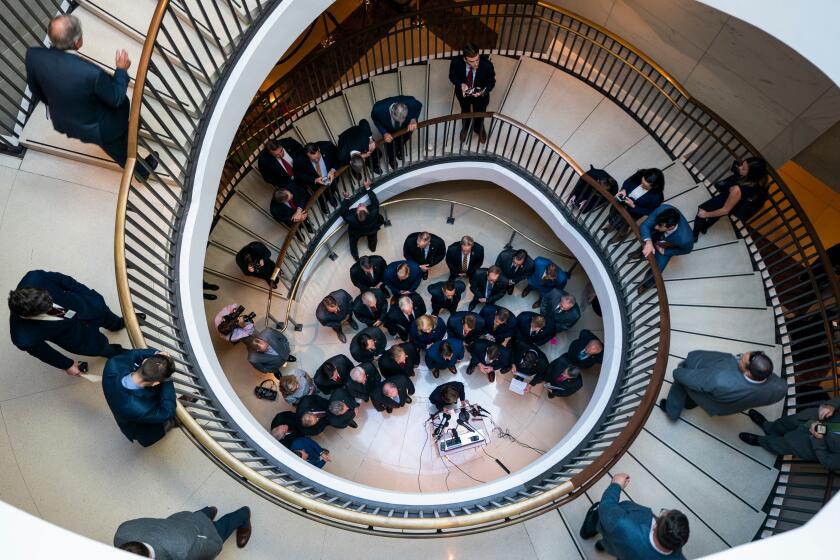House to take first vote on Trump impeachment inquiry this week

- Share via
WASHINGTON — House Democrats have decided to hold a formal vote on impeachment proceedings against President Trump, a step they had resisted for several weeks, and one that will provide the first public test of sentiment in the House on the divisive issue.
The vote could come as early as Thursday, Democratic leaders said.
Enough Democrats have publicly said that they support the inquiry, which has been underway since late September, that the outcome is not significantly in doubt. But each side will be watching to see how many defections the other suffers.
At this point, all but a handful of the 234 Democrats in the House have indicated they support at least an inquiry into whether Trump has committed an impeachable offense; so has one independent, Rep. Justin Amash of Michigan, who left Republican ranks because of his opposition to Trump’s actions.
Early in the process, House Speaker Nancy Pelosi (D-San Francisco) sought to shield Democrats from swing districts from voting on the issue. As support for the inquiry has grown among Democratic voters, that has stopped being a concern, although some of the details of the resolution, and what rights it might give to the Republican minority, have remained an issue.
None of the 197 Republicans have said publicly that they back an inquiry, although several have indicated that they would be open to supporting one. Whether any of them will be willing to break ranks on a formal vote remains unknown, and the White House and Republican leaders immediately began trying to discourage defections by casting the vote as too little, too late.
The impeachment inquiry centers on Trump’s actions toward Ukraine. So far House investigators have taken depositions from a number of witnesses who have described how Trump ran policy toward that country through a back channel heavily influenced by his personal lawyer, Rudolph W. Giuliani.
The witnesses have told investigators that the president ordered important military aid to Ukraine frozen as Giuliani and other White House emissaries pressured the country’s president, Volodymyr Zelensky, to make a public statement about investigating former vice president Joe Biden and his son, Hunter, and Trump’s groundless belief that Ukraine actively supported Democrats in the 2016 presidential election.
The resolution would lay out ground rules for the public part of the impeachment inquiry, which is expected to begin in November, after several weeks in which House committees have interviewed witnesses behind closed doors. It will also establish procedures for the next steps in the inquiry.
Those public hearings will be led by the House Intelligence Committee, the panel’s chairman, Rep. Adam B. Schiff (D-Burbank) said.
The resolution, the text of which will be filed Tuesday, is aimed at “ensuring transparency and providing a clear path forward,” House Rules Committee Chairman Jim McGovern (D-Mass.) said in a statement Monday.
That would do nothing to fix the flaws in the existing process, House Republican leader Kevin McCarthy of Bakersfield insisted.
“It’s been 34 days since Nancy Pelosi unilaterally declared her impeachment inquiry. Today’s backtracking is an admission that this process has been botched from the start,” he said on Twitter. Although Republicans have previously demanded that the full House vote to authorize any impeachment inquiry, “we will not legitimize the Schiff/Pelosi sham impeachment,” he said.
The White House followed suit.
“Democrats were conducting an unauthorized impeachment proceeding, refusing to give the president due process, and their secret, shady, closed door depositions are completely and irreversibly illegitimate,” spokeswoman Stephanie Grisham said in a statement.
Dozens of GOP lawmakers, including some of Trump’s most loyal supporters, have been attending the closed-door impeachment hearings -- given equal time to ask questions.
Republicans and White House lawyers have made much of the fact that Pelosi directed three committees to begin the impeachment inquiry without holding a vote of the full House. That departs from the precedent set in the impeachment proceedings targeting Presidents Nixon and Clinton in 1974 and 1998, they have argued.
A federal judge rejected that argument on Friday, however.
“A House resolution has never, in fact, been required to begin an impeachment inquiry,” federal district judge Beryl A. Howell wrote in a decision upholding the right of the House Judiciary Committee to obtain material that Special Counsel Robert S. Mueller III submitted to a federal grand jury.
The legal victory removed a concern among some Democrats that holding a vote might undermine the House’s arguments in court because it could be interpreted as conceding the need for an authorizing resolution. In a letter to Democrats, Pelosi said the House would vote now to remove any doubt about whether the president and administration officials need to comply with demands for documents and testimony.
The resolution “affirms the ongoing, existing investigation that is currently being conducted by our committees as part of this impeachment inquiry, including all requests for documents, subpoenas for records and testimony, and any other investigative steps previously taken or to be taken as part of this investigation,” Pelosi said in her letter.
It will also establish “the procedure for hearings that are open to the American people, authorizes the disclosure of deposition transcripts, outlines procedures to transfer evidence to the Judiciary Committee as it considers potential articles of impeachment, and sets forth due process rights for the president and his counsel.”
“We are taking this step to eliminate any doubt as to whether the Trump Administration may withhold documents, prevent witness testimony, disregard duly authorized subpoenas, or continue obstructing the House of Representatives,” she said.
In an interview with U.S. newspaper columnists, Pelosi stressed that the vote was on procedures, not on whether to impeach.
“We have no decision made to impeach,” she said. The vote is “making known how the rules will go.”
Although the administration has used the lack of a House vote to justify not complying with subpoenas, several longtime career federal workers — mainly with the State Department — have defied orders not to appear before the investigating committees when subpoenaed.
On Monday, however, former White House official Charles Kupperman, who was a top deputy at the National Security Council, failed to show up for his scheduled closed-door deposition. Last week he asked a federal court in Washington to rule on whether he was legally required to appear.
Schiff said Kupperman’s suit has no merit and he expected the court to throw it out.
Schiff added that the House would not delay its work to wait for cases about compliance with subpoenas to wend their way through the courts.
“We are not willing to allow the White House to engage us in a lengthy game of rope-a-dope in the courts,” he said. Instead, Kupperman’s refusal, and the White House order not to appear, add to the evidence for an impeachment count based on obstruction of Congress, he said.
“If this witness had something to say that would be helpful to the White House they would want him to come and testify. They clearly don’t,” Schiff added.
More to Read
Get the L.A. Times Politics newsletter
Deeply reported insights into legislation, politics and policy from Sacramento, Washington and beyond. In your inbox twice per week.
You may occasionally receive promotional content from the Los Angeles Times.












